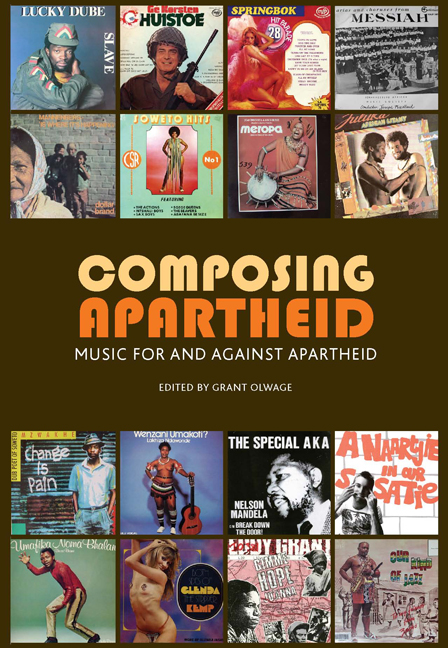Book contents
- Frontmatter
- Dedication
- Contents
- Acknowledgements
- Introduction
- Chapter 1 Back to the Future? Idioms of ‘displaced time’ in South African composition
- Chapter 2 Apartheid's Musical Signs: Reflections on black choralism, modernity and race-ethnicity in the segregation era
- Chapter 3 Discomposing Apartheid's Story: Who owns Handel?
- Chapter 4 Kwela's White Audiences: The politics of pleasure and identification in the early apartheid period
- Chapter 5 Popular Music and Negotiating Whiteness in Apartheid South Africa
- Chapter 6 Packaging Desires: Album covers and the presentation of apartheid
- Chapter 7 Musical Echoes: Composing a past in/for South African jazz
- Chapter 8 Singing Against Apartheid: ANC cultural groups and the international anti-apartheid struggle
- Chapter 9 ‘Nkosi Sikelel' iAfrika’: Stories of an African anthem
- Chapter 10 Whose ‘White Man Sleeps’ Aesthetics? and politics in the early work of Kevin Volans
- Chapter 11 State of Contention: Recomposing apartheid at Pretoria's State Theatre, 1990–1994. A personal recollection
- Chapter 12 Decomposing Apartheid: Things come together
- Chapter 13 Arnold van Wyk's Hands
- Contributors
- Index
Chapter 9 - ‘Nkosi Sikelel' iAfrika’: Stories of an African anthem
Published online by Cambridge University Press: 20 April 2018
- Frontmatter
- Dedication
- Contents
- Acknowledgements
- Introduction
- Chapter 1 Back to the Future? Idioms of ‘displaced time’ in South African composition
- Chapter 2 Apartheid's Musical Signs: Reflections on black choralism, modernity and race-ethnicity in the segregation era
- Chapter 3 Discomposing Apartheid's Story: Who owns Handel?
- Chapter 4 Kwela's White Audiences: The politics of pleasure and identification in the early apartheid period
- Chapter 5 Popular Music and Negotiating Whiteness in Apartheid South Africa
- Chapter 6 Packaging Desires: Album covers and the presentation of apartheid
- Chapter 7 Musical Echoes: Composing a past in/for South African jazz
- Chapter 8 Singing Against Apartheid: ANC cultural groups and the international anti-apartheid struggle
- Chapter 9 ‘Nkosi Sikelel' iAfrika’: Stories of an African anthem
- Chapter 10 Whose ‘White Man Sleeps’ Aesthetics? and politics in the early work of Kevin Volans
- Chapter 11 State of Contention: Recomposing apartheid at Pretoria's State Theatre, 1990–1994. A personal recollection
- Chapter 12 Decomposing Apartheid: Things come together
- Chapter 13 Arnold van Wyk's Hands
- Contributors
- Index
Summary
Footprints of cultural artefacts travel across borderlands and boundaries of multiple inscription, from villages to towns and back again, between territories of the imagination and fetishised, armed and dangerous national states, imprinted in landscapes of experience and practice. Anthropologists and oral historians have recently become fascinated with how rumours, fantastic tales, songs, and images become enshrined in a mobile African popular culture taken for granted by many of those who partake of it. Children's songs, for example, have in their resilience played an important role in the indexical transmission of African history. So the demarcation of Basutoland's colonial borders by the British Resident Major Warden is memorialised in the satirical Basotho children's verse, ‘Majoro Wardene, Majoro Wardene, Nka thipa ea hao u sehe naha’ (‘Major Warden, Major Warden / Take your knife and cut the country’). The objects circulating in this mobile popular culture blur the boundaries between sacred and secular, as well as public and private social life. In music, as with other popular arts, the framing of images through lyrics, harmonies, and melodies inscribes historic moments in what Johannes Fabian calls a remembrance of the present (1996: 226-77). Each rendition of a song is connected to the community or context in which it is performed, imbuing the piece with a distinctive, historically emergent social and political meaning.
The hymn ‘Nkosi Sikelel’ iAfrika’ (‘God Bless Africa’), known as the African as well as South African national anthem, occupies a field of such experience and practice at the intersection of public religion and popular culture. Two decades ago, one of us wrote that ‘“Nkosi Sikelel’ iAfrika” has come to symbolise more than any other piece of expressive culture the struggle for African unity and liberation in South Africa’ (Coplan, 1985: 46). Yet the song∇s popularity extends beyond the borders of South Africa and the confines of the liberation struggle, especially during apartheid, that it so actively animated. Composed in the form of a blessing, the hymn offers a message of unity and uplift and an exhortation to act morally and spiritually on behalf of the entire African continent. A closer examination of the variations in both the hymn and its contexts of performance, however, reveals the complexities of its messages as they are presented in different performative spaces.
- Type
- Chapter
- Information
- Composing ApartheidMusic for and against apartheid, pp. 185 - 208Publisher: Wits University PressPrint publication year: 2008



